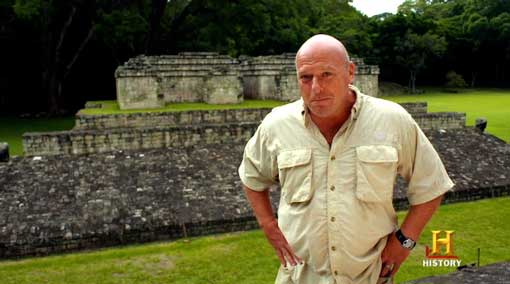
Even though he's not a cop, he plays one on TV. And that's enough street cred for Dean Norris to dive deep into the history of drugs and their use on the new special The Stoned Ages(premiering Wednesday at 9 p.m. ET on the History channel). From ancient opium use to new medications hatched out of multinational corporations, the two-hour show looks at the roles drugs have played in our lives since humans discovered what plants could do for our health and our consciousness -- good or bad.
Norris is, of course, part of the high-powered acting ensemble on AMC's Breaking Bad, currently in its fourth season from creator Vince Gilligan. Norris plays Hank Schrader, a DEA agent slowly closing in on the Southwestern meth kingpin mysteriously known as "Heisenberg." Just so happens that his target, unbeknownst to him, is also his mild-mannered brother-in-law, Walter White, brilliantly played by three-time Emmy winner Bryan Cranston.
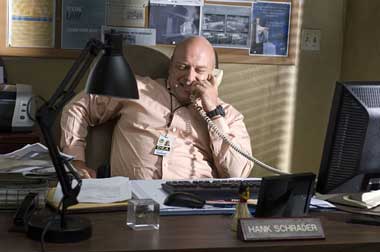
But Norris is a gifted veteran actor in his own right, portraying Hank with great range and nuance, from his blustering presence in the DEA squad room, to his bedroom where he convalesces this season after a failed drug-cartel assassination attempt left him partially paralyzed. I spoke with him by telephone last week about The Stoned Ages and all things Breaking Bad.
The crackling sense of humor he brings to Hank's character is very much a part of his own, and the Harvard grad laughed readily while discussing his History special, which investigates the origins of drug cultivation and repercussions into the modern day.
The History team spent a month on the road, traveling to Mexico, Greece, England, Honduras and other locations, talking to experts and historians. Norris said he had a lot of fun making the special, and it shows. In one segment, he goes on a field trip to Tampa, to hunt for psilocybin mushrooms (the magic kind). He turns to his local guide, who has one in hand to show him, and says, "So, this is the part where I arrest you for possession?"
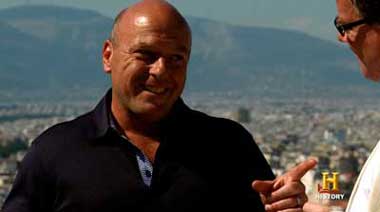
He told me he was surprised to learn about the regular use of psychedelic drugs early in civilization, particularly when the Greeks used to conduct The Fumigation. "It was when policy makers sat around burning cannabis as a ritual and a way to open up discussions on politics," he said. "No pot, no democracy."
But The Stoned Ages is decidedly not a program about the morality of drug use, nor is it all laughs. Norris said the show prides itself on its journalistic mission. Its balanced approach examines drugs' role in culture and society, the medical and spiritual use of substances, addiction, even the international financial stakes involved in developing new drugs: Are they being developed for healing, or being developed to sell? Whether something has a history of acceptance or stigmatization, he said, "we try and let the viewer come to their own conclusions."
No talk with Norris could be complete without discussing the show now routinely referred to as one of TV's greatest projects -- Breaking Bad. After 25 years working in Hollywood, Norris realizes how special this show experience has been. "It's rare," he said.
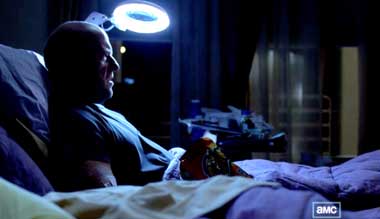
How does he think the current Season 4 has stacked up against the others? "I do miss the earlier episodes where the show was freer and a little bit lighter and more able to go into the humorous side with Walt and Jesse," Norris said. "When they started out, they were just finding their way, learning the business. They screwed up. The stakes are much higher now, and there's not as much room for the black comedy. It's absolutely appropriate for where the characters and the story are at, but I do miss that."
Now that Breaking Bad creator Vince Gilligan has announced he'll do one more season, he has talked a little about how it will unfold. "There will be 16 more episodes done after Season 4, but there is talk about how It will probably be released in two 8-show mini-seasons . . . 16 shows is about one-third of what we've shot so far, so that's a quarter of the story yet to be told."
Perhaps the series' finest achievement lies in its art direction, production values and attention to detail, giving it a cinematic look. Norris notes the show "is shot on film. It costs more to do it that way, but all the AMC shows are, and that's something else that sets them apart . . . AMC was a little-known network, and they felt that they had to go very big with the shows they selected and their artistic decisions."
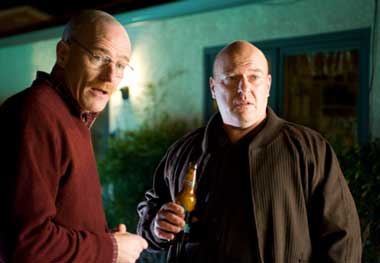
Same goes for his production team. "Vince has picked the right people for the right jobs. We don't go longer than the normal shooting days of 12-14 hours. There's a sense of ease when we're shooting. No one is screaming at each other. It's a pretty well-oiled machine."
Gilligan is on record saying he knows Walt will die at the end of the series, and it's still a question as to whether Hank will turn him in. I told Norris that I've harbored my own preposterous/clever ending for the series: Walt beats his cancer but then is tried for capital murder committed during drug offenses, making it a Federal crime. He receives the death penalty and is executed by lethal injection.
Norris roared with laughter at the suggestion, but said he honestly didn't know where the show will end up. "There are too many possibilities, between all the characters and their relationships . . . Vince has a strong sense of justice, karma and consequences. Walt won't be getting away with anything."
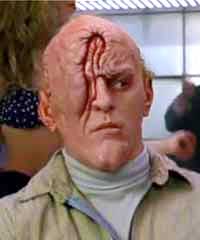
Norris has worked steadily in Hollywood throughout his career, guesting in memorable TV and film projects from The Equalizer to NYPD Blue to The West Wing, while also making movies from Total Recall to Little Miss Sunshine. You might remember him in Total Recall as Tony, one of the mutated Mars rebels [photo at right]. It's an impressive pedigree.
So what comes after Breaking Bad? Norris will be free this time next year, he said, and "the pressure is to follow it up with a more mainstream network show." But if his wife doesn't mind, he'd like to pursue more alternative options like Breaking Bad and "find another 13-episode [per season] cable drama."
For now, he's on a buzzed-about show, with all the attendant benefits. So pardon my curiosity about one last thing. I asked Norris, as one bald guy to another, with his current notoriety, how goes it getting looks from the ladies?
He laughed again. "Better," he said. "Funny how that works."